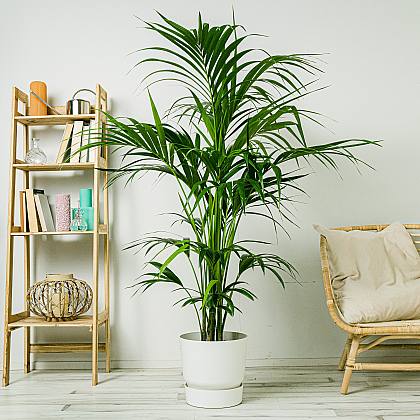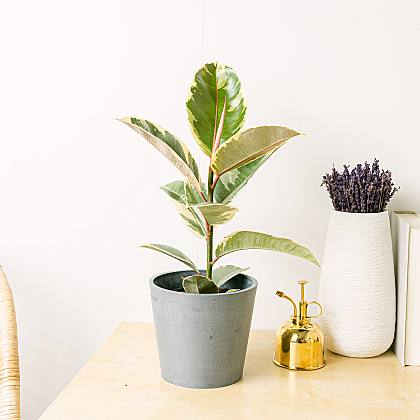Improve the air quality in your home thanks to these plants
The air quality in our home is critical to our health and well-being. Fortunately, there are houseplants that can help us purify the air and improve its quality
The air quality in our home is critical to our health and well-being. Fortunately, there are houseplants that can help us purify the air and improve its quality. These plants have a powerful ability to filter out toxins and harmful substances, thus creating a healthier and cleaner environment. In addition, its presence in the home has a relaxing and revitalizing effect, transforming our space into a green oasis. In this article, we'll explore the importance of air quality in our home and discover some plants that will help us achieve this.
The importance of air quality in our homes
The quality of the air in our home is a determining factor for our health and well-being. We spend much of our time indoors, and if the air we breathe is not clean, we can suffer from various health problems, such as allergies, asthma, fatigue, and headaches. In addition, poor air quality in the home can aggravate chronic respiratory diseases such as chronic obstructive pulmonary disease (COPD) or lung cancer. Indoor air pollutants can come from a variety of sources, including cleaning chemicals, tobacco smoke, building materials, furniture, and electronics. Therefore, it is important to take steps to improve the air quality in our home. An effective way to do this is by introducing houseplants. Plants have the ability to absorb toxic gases and harmful substances from the air and convert them into fresh, healthy oxygen. In addition, plants also help regulate air humidity and reduce carbon dioxide levels. In short, maintaining good air quality in our home is critical to our long-term health and well-being. The introduction of houseplants is an effective and natural way to improve the air quality in our home and enjoy a healthier and more relaxing environment.
Houseplants: allies to purify the air
Houseplants: allies to purify the air
Not only are houseplants a beautiful addition to our home décor, but they also play a critical role in improving the quality of the air we breathe. These plants are true allies when it comes to purifying the air and removing toxic substances. Through a process called phytoextraction, plants absorb pollutants present in the air, converting them into nutrients for their growth.
Some of the most effective houseplants for purifying the air include peace lily, bamboo palm, Boston fern, and dracena marginata. These plants have the ability to filter out common toxins such as formaldehyde, benzene, and trichloroethylene, which are found in household chemicals, paints, and cleaning products.
In addition to their power to remove harmful substances, plants also have a relaxing and revitalizing effect on the environment. Studies have shown that having plants in our environment can reduce stress, improve our mood, and increase our productivity.
To ensure the effectiveness of these plants in purifying the air, it is important to provide them with proper care. This involves providing them with the right amount of sunlight, water, and nutrients, as well as keeping them free of pests and diseases.
In short, houseplants are indispensable allies when it comes to improving the air quality in our home. Not only do they offer us a green and beautiful oasis, but they also help us breathe cleaner, healthier air. So don't hesitate to transform your home into a haven full of these wonderful plants.
Plants' Powerful Ability to Filter Toxins
Plants have an incredible ability to filter toxins into the air. Studies have shown that they can remove up to 87% of contaminants in just 24 hours. NASA has conducted detailed studies on how plants can help purify the air on space stations, and they have found that certain plants are especially effective at removing harmful substances such as benzene, formaldehyde, and trichloroethylene. Plants absorb these toxins through their leaves and roots, and transform them into nutrients for their growth. In addition, plants also release oxygen during photosynthesis, which helps improve overall air quality.
Among the most effective plants for purifying the air are bamboo palm, mother-in-law's tongue, ficus, and pothos. bamboo palm is known to be one of the most effective plants in removing formaldehyde, while mother-in-law's tongue is excellent for removing benzene and trichloroethylene. Ficus is ideal for the removal of volatile organic compounds (VOCs), which are commonly found in cleaning products and paints. Finally, pothos is ideal for the removal of carbon monoxide and xylene.
In short, having plants in the home can have a significant impact on indoor air quality. Not only can they help remove harmful substances like benzene and formaldehyde, but they can also provide extra oxygen and create a more relaxing and revitalizing environment. It is important to choose the right plants to ensure their effectiveness and maintain them properly to maximize their ability to purify the air.
Plants That Absorb Harmful Substances Common in the Home
Plants that absorb harmful substances common in the home are an excellent option for improving air quality in our indoor spaces. These plants have the ability to filter and eliminate toxins present in the environment, becoming true allies for our health. Among the most common harmful substances are formaldehyde, benzene and trichloroethylene, which are present in cleaning products, paints and furniture. Some plants that are effective for absorbing these substances are peace lily, spathiphyllum, bamboo palm, and pothos. These plants not only purify the air, but also bring beauty and freshness to our home. It is important to place them strategically in areas where there is a higher concentration of these substances, such as the kitchen or near new furniture. In addition, it is essential to keep plants clean and dust-free to ensure their effectiveness. Watering them regularly and providing them with the right amount of light will also contribute to their proper functioning. With these plants in our home, we can transform it into a healthier and pollutant-free space, benefiting our health and well-being.
The relaxing and revitalizing effect of plants on the environment
Plants are not only great for purifying the air, but they also have a relaxing and revitalizing effect on the environment. Studies have shown that the presence of plants in enclosed spaces can reduce stress and anxiety levels in people. In addition, they can help improve sleep quality and increase productivity at work.
Plants have the ability to create a calm and serene environment thanks to their natural beauty and the subtle movement of their leaves. The simple act of caring for them and watching them grow can be a relaxing and therapeutic activity for many people.
On the other hand, plants can also have a revitalizing effect on the environment. Some spices, such as mint, peppermint or rosemary, emit fresh and stimulating aromas that can improve mood and increase energy. It has even been shown that the presence of plants in hospitals and rehabilitation centers can help speed up the recovery process for patients.
In short, having plants in our home or office not only helps us breathe cleaner air, but it can also have a positive impact on our mental and physical health. So don't hesitate to include some plants in your décor to create a relaxing and revitalizing atmosphere.
Care and maintenance of plants to ensure their effectiveness
Care and maintenance of plants to ensure their effectiveness
Proper care and maintenance of plants are essential to ensure their effectiveness in purifying the air in our homes. To keep them healthy and in optimal condition, it is important to follow some basic tips. First of all, it's crucial to provide them with the right amount of light. Each plant has different light needs, so it is essential to research and know the specificities of each species. In addition, regular and proper watering is also vital. It's important not to overdo or fall short with water, as both of these situations can be detrimental to plants. proper drainage is also necessary to prevent waterlogging of the roots. Another important consideration is temperature and humidity. It is essential to maintain a suitable environment for each type of plant, avoiding sudden or extreme changes that may affect its development. In addition, attention should be paid to dust and insects that can adversely affect plants. Regularly cleaning the leaves with a damp cloth and regularly checking for pests are key preventative measures. Finally, don't forget to fertilize your plants on a regular basis to ensure they get the nutrients they need to grow and thrive. By following these care and maintenance guidelines, we will be able to enjoy healthy plants that are effective in purifying the air in our home.
Transform your home into a green oasis with these plants
Transforming your home into a green oasis is possible thanks to plants. Choosing the right plants for each space is key to achieving a harmonious décor while improving air quality. In the living room, large pots with evergreens such as bamboo palm or ficus lyrata can be placed, which are not only visually appealing, but also help absorb carbon dioxide and other harmful substances present in the environment. For bedrooms, plants with relaxing properties such as lavender, jasmine or aloe vera are ideal for creating a serene and tranquil environment. In addition, these plants have the ability to purify the air and improve the quality of sleep. In the kitchen, aromatic herbs such as rosemary, mint or thyme can be placed, which in addition to adding flavor to your meals, also act as natural deodorants and eliminate bad odors. In the bathroom, plants that prefer moist environments such as ferns or water lilies are a great choice for creating a cool and relaxing environment. It is important to remember that each plant has its own care and maintenance needs, so it is essential to inform yourself about their requirements before purchasing them. With these plants, you can transform your home into a green oasis and enjoy a healthier and more relaxing environment.
Indoor plants are not only decorative elements in our home, but also allies in improving the quality of the air we breathe. Its ability to filter toxins and absorb harmful substances is impressive. In addition, their presence provides us with a relaxing and revitalizing environment. However, it is important to remember that these plants require proper care and maintenance to ensure their effectiveness. So, if you want to transform your home into a green oasis and enjoy cleaner air, consider incorporating some of these plants into your space. Reflect on how you can integrate them into your daily routine and how you can promote a healthier environment for you and your family. Remember that caring for the environment starts in our own home


